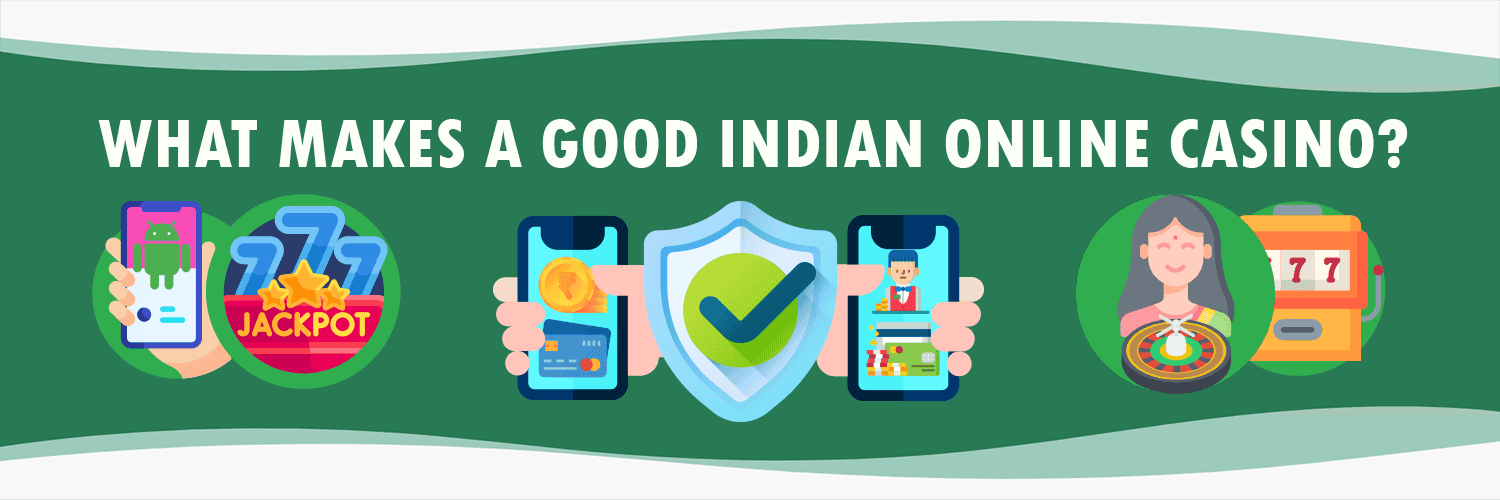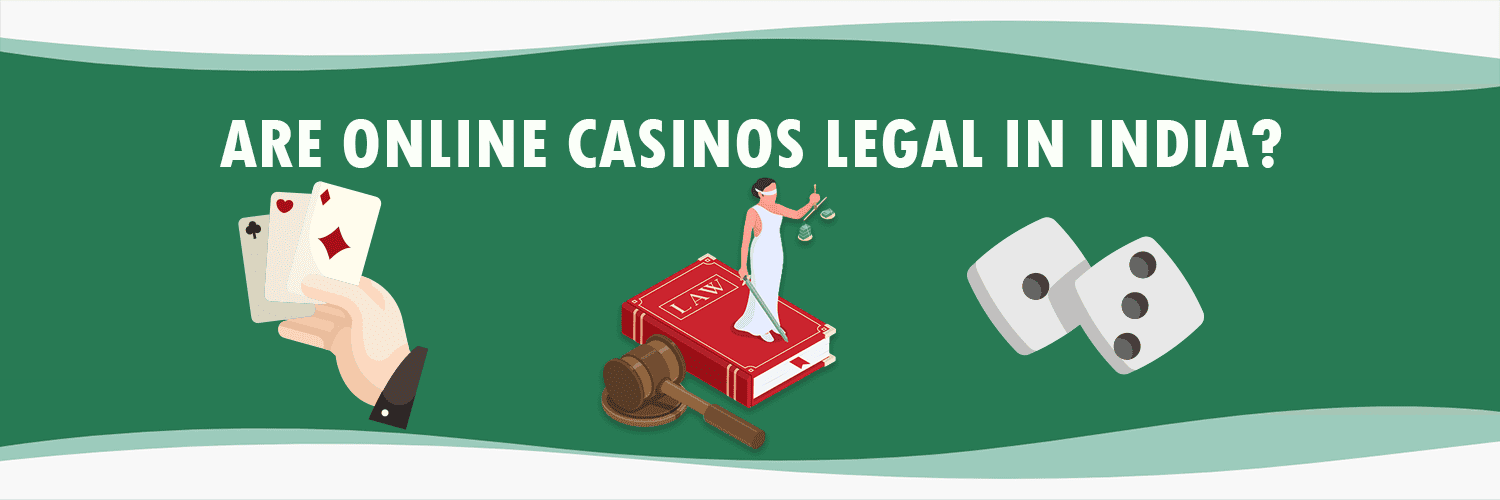Top Casinos in India | July 2025
The list is re-evaluated on a monthly basis.

Online gambling for real money in India
India is bustling with gambling culture; from horse racing, bumper draws, and Taash parties to cricket betting, Janmashtami Teen Patti traditions and Rummy rooms, gambling is second nature in Bharat. No wonder online gambling for real money continues to grow!
Today, desi players all over India enjoy the thrill of roulette, online slots, blackjack, baccarat, Teen Patti, Andar Bahar, and more directly from their mobile phones. And this is also where we nowadays get our odds for the IPL, T20, and even Kabaddi tournaments.
And while the online casino market is booming, the number of casinos promising profit and fame can easily become overwhelming.
But don’t worry. We have decades of experience in the online casino industry and know what truly makes a good online casino. All the hard work has already been done, as we have hand-selected five of India’s top real money casino websites, created complete casino reviews for each one, and listed them below. All you have to do is take your pick.

Casino Days – India’s #1 Real Money Online Casino
With over 5000 real money online casino games and a streamlined design, our review of Casino Days confirms this to be our top choice for the best online casinos in India in 2025. Live casino players have over 400 tables to choose from, provided by award-winning software providers like Evolution and Ezugi.
You can play at Casino Days through a browser or online casino app, both offering a streamlined experience and the possibility for in-game deposits. New players get their first deposits matched with bonus funds of up to ₹1,00,000 and receive a ₹500 Free Bet.
The unique cash bonus mechanic lets you wager your casino bonuses with your real money balances, unlocking the real cash bonus amount in full once requirements are met–a clever way to ensure that you’ll always receive 100% of the bonus in withdrawable cash.
Casino Day’s best:
- There is a generous welcome bonus, reload bonuses, and several other valuable bonus promotions and raffles.
- A game library continuously updated with all the latest and most popular casino games.
Casino Day’s worst:
- It is not possible to place bets on sports as it does not have a sportsbook.
- Lacks the ability to filter games in the search tool.
Pros
- Personal Cashback feature
- Automatic raffle qualification for playing
- App for both iOS and Android
- Easy website navigation
Cons
- No sports betting
- Occasional technical withdrawal issues

Bettilt – Sport, Casino, and Live all in one place
Players who enjoy sports, casino games, live casino entertainment, or the thrill of poker will enjoy Bettilt casino. After completing a Bettilt review, it enters our list as one of the very few Indian online casinos also offering player-vs-player poker games, Bettilt knows how to deliver a great gambling experience.
New players get a welcome bonus of up to ₹1.25 lakh and 225 Free Spins when they sign up via SevenJackpots, and can then take advantage of cashback, happy hours, birthday gifts, and a profitable VIP program.
Bettilt’s BetRush features allow sports punters to “pre-bet” using potential winnings from active bets, allowing for instant coverage of your most anticipated odds. Join the action with deposits as low as ₹250 using IMPS or ₹500 for methods like UPI and PhonePe.
Bettilt’s best:
- Exclusive welcome bonus offers for SevenJackpots online casino and sports players.
- State-of-the-art poker tables where you play against other players.
Bettilt’s worst:
- There are no sub-categories in the live casino game library.
Pros
- Website in English and Hindi
- Android and iOS app
- Low ₹250 min. deposit
Cons
- No crash game category
- Unorganised live casino game library

Big Boost – Over 4000 casino games
Big Boost is yet another top-quality online casino from the creators behind Casino Days. With its warm tone and streamlined design, Big Boost casino suits anyone looking for hassle-free online gambling. We found navigating the website during our Big Boost casino review to be a breeze, and you can even top up your account balance in-game.
Your Big Boost welcome offer mirrors the one at Casino Days, providing a deposit bonus of up to ₹1,00,000. Alternatively, you can choose a 100% match on your first ₹1,000 deposit with just a 5x wagering requirement.
Although this online casino lacks a sportsbook, its library boasts over 4,000 real money games. The collection is regularly updated with new releases while preserving classics like Razor Shark, Book of Dead, and XXXTreme Lightning Roulette.
Big Boost’s best:
- Two generous welcome bonus offers to choose from when signing up.
- Super easy website navigation thanks to its simple design.
Big Boost’s worst:
- The site lacks game categories for table games and video poker.
Pros
- In-game deposit option
- High-quality games
- Cash bonus mechanic
Cons
- No sports betting options

Rajabets – Exceptional casino for desi players
Rajabets is an online casino that works extra hard to cater for its Indian players. The casino is available in Hindi, Telugu, or English and is filled with games, odds, and bonus offers. Players who prefer to play via an app can do so by downloading the Rajabets app, which is compatible with most Android devices.
While playing casino games online at this casino, we recommend the Rajabets exclusive games. Found only at this casino, these branded games will give a new twist to your gameplay. The Indian game categories collect all desi-themed games in one place, making it easy for you to play titles with familiar themes or native-speaking dealers.
Boost the value of your money with a Rajabets bonus. Choose from a variety of tournaments, free spin offers, unique Aviator bonuses, and cashbacks to enhance your session in a way that suits your gaming style or preferences. Learn everything about this casino in the full Rajabets casino review.
Rajabets’ best:
- Weekly Wheel of Fortune draws with great prizes.
- it is possible to deposit using Amazon Pay and WhatsApp Pay.
Rajabets’ worst:
- The sign up bonuses have unfair terms and conditions.
Pros
- Diverse payment options
- Low ₹200 min. deposit limit
- Hindi and Telugu language options
Cons
- Some bad sign up bonus terms
- No unique sportsbook tools

Parimatch – Unrivalled sports betting
Parimatch is the grandmaster of online sports betting, having offered betting online since 1994. This online casino has accepted Indian players since 2021 and continues to deliver impeccable online gambling, even sponsoring ISL teams NorthEast United and Kerala Blasters.
While Parimatch is a great sportsbook, our Parimatch review revealed that it is also an impressive casino brand. There are over 70 exclusive game titles within the game library, along with over 9000 other real money games. The large library is split into smaller, more digestible sections, making browsing easy and fun.
All Indian players are welcome at Parimatch, and both the website and casino app are available in English, Hindi, Bengali, Telugu, Marathi, and Tamil.
Parimatch’s best:
- One of India’s best online sports betting websites.
- Multi-language support even on the downloadable Android Parimatch app.
Parimatch’s worst:
- The only responsible gambling tool offered is self-exclusion.
Pros
- Massive game library
- Deposit and withdraw with UPI
- Android casino app
Cons
- Lack of RG-tools
- No iOS app

What makes a good Indian online casino?
Finding decent online casinos takes time, so we have done all the hard work for you. There are many things to keep in mind and to try out before being able to determine the quality of a casino.
Our experts have decades of experience reviewing online casinos and know exactly what to look for. We carefully analyse and regularly re-review every single casino listed here at SevenJackpots. When finding those golden gambling gems, these are some of the things we look out for:
Game selection
We expect most online casinos to offer a wide variety of games. Preferably a couple of thousand games, divided into popular categories like roulette, slots, blackjack, Andar Bahar, Teen Patti, crash games, baccarat, and more. The games must be provided by well-known licensed software providers known to audit their games regularly.
Navigating the game library is also important. A balanced and well-curated library with several intriguing game categories allows us to explore familiar games and try our luck at new titles and game types. The ability to create a game category of our favourites is a big plus.
Payment methods
Every player is different, so there should be several different payment methods to choose from when depositing and withdrawing money from an online casino. Most payments made to Indian online casinos occur through mobile devices, and the casino should reflect this. Local methods like UPI, PhonePe, and IMPS are welcome sights, as they ensure smooth transactions for desi players.
But the review of payment methods does not stop there. It is equally important for minimum deposit and withdrawal limits to be reasonable and for transactions to be processed quickly. Lastly, casinos should not add hidden fees to transactions, something we carefully review the casino’s T&Cs to confirm.
Customer support
Any top online gambling site will have an experienced and readily available customer support team. Often available via live chat, the customer support stands ready to assist with any question or issue you might have. Players gamble at all hours of the day, so a support team available 24/7 is a must, and support in native languages like Hindi and Telugu is an extra plus.
Additional means of contacting customer support can open alternative ways to get help. Telegram, WhatsApp, email channels, and even phone support are good indicators of well-covered customer support.
Responsible gambling
Since you are playing with your own hard-earned money, we want the casino to take good care of you. Offering various tools and information for responsible gambling is one way a casino can care for your safety and health when playing.
A gambling operator that provides information on responsible gambling and tools to help players gamble with control shows that it cares for its players. We prefer casinos that let you activate the tools of your choice from within your casino account. They should also have information about what problem gambling is and mention external organisations that can help when there is concern for problem gambling.
Fairness and security
It should be safe to play with real money online. You want to feel secure when playing and trust that the games you are playing are genuine and fair. Legitimate Indian online casino sites need a valid gambling license and a strongly encrypted website. These measures ensure that your data and money are kept safe and that all games offered are legitimate.
The right casino site for you should also collaborate with independent auditors like eCOGRA or iTechLabs to guarantee that each game is working as it should and that no security flaws are present.
Bonuses and promotions
Despite not being a requirement, welcome bonuses and other promotions greatly improve our gambling experience. Bonus offers are great ways to increase the worth of our deposited funds, and can add winnings on top of our own in the form of money, free spins, cashback, or even physical rewards like new mobile phones, trips, or even a new car.
However, we carefully analyse bonus terms and conditions to ensure that all offers are fair and that participation is easy. Genuine casinos will have simple bonuses with transparent rules.
Web and app usability
Regardless of how fancy an online casino is, we are there to play, not to navigate the website. The best sites will be easy to navigate, load quickly, and be fully optimised for mobile devices. Apps should be lightweight, easy to install and use, and provide the same selection of games as the website.
A well-designed cashier is a key aspect of a casino. Ease to find, open, and complete transactions is a must.
Indian focus
A casino with a clear focus on Indian players shows that it is ready to support you as a desi gambler. Thanks to the localised focus, you can be sure that the customer support is experienced in Indian queries, that you will have local payment methods to choose from, and perhaps even the ability to navigate the website or app in your native language.

Are online casinos legal in India?
Gambling in India is legislated in two ways: nationally and on a state-by-state basis. Online casinos are legal in India as long as they are offshore, save for five states where online gambling has been banned.
Sikkim, Daman, and Goa have legalised gambling, while Maharashtra, Tamil Nadu, Karnataka, Andhra Pradesh, and Chhattisgarh have banned it. Outside of these states, the Public Gambling Act of 1867 applies, which does not mention anything about online gambling being unlawful.
While you can legally continue to gamble online from India, we only recommend playing at casinos holding genuine gambling licenses. Since India lacks its own gambling regulations, casinos will use licenses from other countries. In India, it is common for casinos to hold licenses from Curaçao, Cyprus, the Isle of Man, Gibraltar, or Malta.

How to deposit money at an online casino?
Making a deposit and being ready to play at an Indian online casino today only takes a couple of minutes. To deposit, you need a method of payment, a casino account, and an internet connection. Deposits are done via the online casino’s cashier, and the process is straightforward: follow the instructions presented on your screen, and once the deposit is complete, you will have funds in the account.
It didn’t always go this fast. In the past, deposits were made via bank transfers or credit cards, often taking several days to appear on the gambling account. Today, we can have money in our casino accounts with just a few clicks, thanks to UPI, PhonePe, Google Pay, and other smart payment gateways.
Withdrawals
To cash out your winnings from Indian casino sites and back to your bank account or payment wallet you need to make a withdrawal. Withdrawals are usually made back to the same method used when depositing. If not possible, IMPS is a common withdrawal method at many casino sites.
How much you need to withdraw varies depending on method and casino, but common minimum withdrawal limits range from ₹500 to ₹1500. A withdrawal is usually processed within 24 hours of making the request. Delays can occur pending account verification.

Which are the best online casino payment methods?
The best payment method will be the one you are most comfortable using. Thankfully, any good Indian gambling site will have several methods to choose from, most of which are local and well-known.
The most popular casino payment method in India is UPI. UPI allows you to make transactions using other payment methods as well like PhonePe, gPay, WhatsApp Pay, and other famous Indian payment methods. Other common payment solutions popular among Indian players are Neteller, Skrill, credit cards, AstroPay, IMPS, MuchBetter, Jeton, and cryptocurrencies.
It is important to know whether or not a method of payment will be available for both deposits and withdrawals at an online casino. In most cases, the deposit method will also be used for withdrawals. If that’s not possible, you will need to choose an alternative withdrawal method. IMPS is the most common.
Top 3 casino welcome bonus offers for Indian players in May 2025
A casino welcome bonus is often the best bonus you will receive during your time at a casino. With such a valuable opportunity, you want to make the best choice possible!
To make things easier for you, we have hand-picked the three best welcome bonus offers in India in February. All of these offers have high value and come with fair and transparent terms and conditions.
The best part? It is up to you which one to use, or if you want to use them all!
Bettilt – Exclusive ₹1,25,000 + 225 Free Spins
Players who sign up to Bettilt via SevenJackpots receive a boosted welcome offer! We add ₹45,000 to the existing offer, bringing the total amount to ₹1,25,000, plus 225 Free Spins, spread over your first three deposits:
- 1st Deposit: 100% up to ₹35,000 + 50 Free Spins
- 2nd Deposit: 125% up to ₹40,000 + 75 Free Spins
- 3rd Deposit: 150% up to ₹50,000 + 100 Free Spins
To claim this offer, you need to tap the “Play Now” button in our top list and create an account at Bettilt. Select the online casino welcome bonus in the cashier, deposit at least ₹1000, and the sign up bonus is yours!
Terms and conditions:
- The welcome bonus amount must be wagered 40x.
- Wagering requirements must be met within 7 days.
- Slot games, arcade games and scratch games contribute 100% to the wagering requirement.
- Free Spins are credited in Gates of Olympus, Sweet Bonanza, and Sugar Rush.
Casino Days – 200% up to ₹1 lakh + 500 Free Bet
At Casino Days, new players receive a welcome bonus of up to ₹1,00,000, plus a ₹500 Free Bet. The offer is spread across the first three deposits:
- 1st deposit: 200% up to ₹40,000 + ₹500 Free Bet
- 2nd deposit: 200% up to ₹20,000
- 3rd deposit: 200% up to ₹40,000
Claim the sign up bonus by registering, claiming the offer within the rewards section of the website, and making your first deposit of at least ₹500 within 7 days after registration. This is a cash reload offer. The bonus money is wagered using your real money balance, and is then credited to you in full in cash.
Terms and conditions:
- The Free Bet must be wagered 1x.
- The cash bonus amount must be wagered 35x.
- The time to meet wagering requirements is 7 days from making the qualifying deposit.
- Deposits with ecoPayz, Neteller, and Skrill do not qualify for this offer.
Big Boost – 100% match first deposit bonus with just 5x wagering
At Big Boost, there are two welcome offers to choose from. Either, ₹1,00,000 across the first three deposits you make, or a matched deposit bonus of ₹1000. Since the lakh offer is almost identical to the one at Casino Days, we recommend Big Boost’s second offer:
- Make one ₹1000 deposit and get it matched with a ₹1000 sign up bonus with just 5x wagering
This welcome bonus has two strengths: the low wagering limit, and that wagering can be done on any casino or live casino game. To grab the offer, sign up, claim the offer from the rewards page, and deposit at least ₹1000. Note that this is a regular deposit bonus, so you will use the bonus itself to play towards the wagering requirement.
Terms and conditions:
- The deposit bonus amount must be wagered 5x.
- Wagering can be done on any casino or live casino game.
- The wagering requirement needs to be met within 7 days.
- The minimum withdrawal from this bonus is ₹1600.
- Deposits with ecoPayz, Neteller, and Skrill do not qualify for this offer.

More bonuses and promotions
The welcome bonus is only the beginning of your journey of ongoing casino promotions at online casinos. Bonus offers are valuable and can provide you with a lot of fun, not to mention extra money in your pocket, but there are many different types of casino bonuses out there! To ensure you are investing your time in the ones that complement your gaming style the best, we are listing the most common ones here below or you can visit our India casino promotions page
Start by asking yourself this: Do you want a bonus that you can use straight away, or one that rewards you at a later point in time? Cashback offers are great for late reward-payouts, while deposit bonuses will have you bonus-ready instantly.
In other words, casino bonus can truly enhance your online gaming experience, and there are loads of different offers to choose from:
- Cashback: Get some of your lost money back at the end of a week or month.
- Deposit bonus: Receive extra to play for when making a deposit.
- Reload bonuses: A recurring bonus of the same structure and size every time it is used.
- Free Spins: Lets you spin the reels of selected slot games for free.
- Free Bet: Lets you place sports bets for free.
- Raffle: Receive tickets to a recurring draw for a chance at various prizes.
- No-deposit bonus: No-deposit casino bonuses are credited to your account without the qualifying requirement of depositing.
- Casino Tournaments: Climb the leaderboard of a tournament to win prizes.
- Cash Drops: Extra cash drops randomly to players playing selected games.
- VIP bonus: Often personalised bonus offers provided to you as a token of appreciation.

Favourite Casino Games in India
Online casinos are not limited by space and often host thousands of casino games all in one place. This is one of the reasons online gambling is so popular; you can find all sorts of games here. Some games are so logistically advanced that normal land-based casinos are unable to provide them!
Thanks to the diversity of games, a good online casino will have something for everyone, and it is up to you to explore the selection and find games that you enjoy playing.
Slot games
Out of all the games you can find at an online casino, most of them will be slot games. Slot machines have been around since 1894, with the first digital video slot released in 1976. It is not unusual for online gaming sites to hold several thousand slots, ranging from traditional “fruit machine” payline slots to more intricate games with expanding reels, unique payout mechanics, and jackpots.
Some of India’s most popular slot machines are Book of Dead, Razor Shark, Starburst, Money Train 2, Reel Rush, and Gonzo’s Quest. Slots are also the easiest to play. All you need to do is press a button, and the game will do the rest.
Roulette
Online roulette is one of the most popular of all casino games in India. The spinning wheel and many betting options make it a thrilling game with lots of winning potential. Playing roulette is easy; just place a bet and watch the ball drop onto the wheel to reveal the winning number. Top online casinos will offer variations of roulette, including European, French, and American tables.
Innovative roulette games like Lightning Roulette are among the most popular. The game adds extra multipliers, creating the possibility of payouts hundreds or even thousands of times larger than a traditional roulette table.
Blackjack
Considered one of the world’s most popular card games, blackjack is a staple at our top-listed casinos. In blackjack, you play against a dealer, where you both try to get as close to 21 as possible. Blackjack attracts beginners and professionals alike thanks to its mix of simple rules and skills. By taking strategic actions on your hand, you can increase your winning potential with an optimal blackjack strategy, making it one of the few casino games where skill improves your odds.
Online blackjack casinos will offer a variety of tables, from classic blackjack to those with unlimited seats, unique side betting options, added multipliers, and more.
Teen Patti
Online Teen Patti brings your favourite Diwali card game straight to your mobile phone. And lets you play and win with real money! Teen Patti, or Flush, is a card game deeply connected to Indian culture. In the online casino version of the game, you play against the dealer. The goal is to have a better hand.
Well-known poker hands influence the ranking of your 3-card hand hand like pairs, three-of-a-kind, straights, and flushes. Since casino Teenpatti lacks the social aspect of playing against other players, it is easier to learn, easier to play, and easier to win!
Andar Bahar
Yet another popular local card game, Andar Bahar, suits online gambling perfectly. The rules are simple: bet on which side, Andar or Bahar, you think will receive the randomly selected joker card. Thanks to there only being two possible outcomes, both main bets have close to 50% chance of winning. This is a contributing factor to the game’s popularity.
When playing Andar Bahar online, players can enjoy the game in a live setting accompanied by a professional dealer or in a digital format, where the player is in charge of deciding the pace of the game.
Live dealer games
Live dealer games are casino games streamed live from a real physical location and are the most immersive form of online gambling. These Live casino tables are streamed from dedicated online casino studios or real land-based casino floors. Online players place bets through a digital player interface and can participate in the game as if they were sitting right there at the table.
Thanks to live streaming, you can play games like live roulette, live teen patti, live andar bahar, sic bo, craps, and more. Even games that are technically impossible to play in a physical setting become a reality online. Crazy Time, Lightning Storm, MONOPOLY Live, Deal or No Deal, Live Cash or Crash, and many other game shows are exclusively available at live casino sites online.
Crash games
Crash games have soared in popularity since the release of Aviator in 2018. Instant win games like these take inspiration from the stock market and other games where we can bet on the outcome of an event. The “flight” concept of crash games provides us players with added freedom and control over our game rounds, where we decide when to cash out and when to keep playing for bigger wins. The unique Provably Fair blockchain technology ensures added security and 100% fairness at all times.
Lottery
Online lottery lets you explore the world’s biggest lotteries, with jackpots far beyond the Lottery Sambad and your regular local bumpers. International lottery draws like Powerball, Mega Millions, and EuroMillions have jackpots thousands of crores big, and you can purchase tickets to the draws from any of our selected online lottery sites!
Sports betting
Cricket is core Indian culture, and millions of desi players bet on the action on the pitch during the IPL, T20, or any other famous league. Placing bets on sports is a thrill, where skill blends beautifully with chance and bets on odds turn into real money payouts for lucky punters. A casino sportsbook offers the possibility to bet on markets pre-match or in-game. Most online casinos with sports odds also offer live streaming of big games in cricket, basketball, football, kabaddi, baseball, and more!
Best online casino with live dealer games?
It is an art form to be able to deliver an immersive live casino experience over a mobile phone or computer. Live dealer games require state-of-art technological solutions. Something the best live casino sites in India are capable of. Platforms like Casino Days, Rajabets, BlueChip, Big Boost, and Bettilt all take extra care to ensure their players can play classic table games and ground-breaking live dealer games alike, all from the comfort of their own homes.
Live games are also the most social games at online casinos in India. It is often possible to chat with other players or with the live dealer, and it is refreshing to see a real person operating the table.
When choosing the best online casino for live casino games at SevenJackpots, you can be sure they will offer these live games:
Live Roulette:
Out of all live dealer games, live roulette is India’s most popular, with Live Lightning Roulette leading the way. Playing roulette in a live setting comes with all the features of a land-based table. From the professional croupier to the sound of the ball as it drops onto the wheel’s numbered slots. Red Door Roulette combines India’s favourite game show, Crazy Time, with roulette for the possibility of having a straight up bet pay up to 4000x!
It is also at the live dealer roulette tables you can come across croupiers speaking your language. Tables like Namaste Roulette and Hindi Roulette feature dealers who speak in Hindi. And at Dafabet online casino there are tables with Telugu speaking hosts.
Game Shows:
Land-based casinos are limited by its physical space, platforms with online live dealer games are not. Using tailor-made game show studios and Augmented Reality technology, online casinos in India are capable of providing their players with mind-blowing casino games. Game shows like Crazy Time and Lightning Storm utilise massive studios filled with bonus games and features to create a gambling experience unlike any other.
Live Blackjack:
Live dealer blackjack is yet another social online casino game as you share the table with up to five other players. Being one of the lucky five to grab a seat at the table is a thrill in its own. It’s even more exciting to play and act according to other players actions. Since blackjack incorporates skill, it is not unusual for players to be social with each other in the chat. And you’ll hear banter similar as that of a poker table at a brick-and-mortar casino.

Best casino sites Casino apps in India
With a casino app, you can instantly access your favourite Indian casino directly from your phone’s home screen. One of the perks is that a downloadable casino application is even safer than a browser casino. In some instances, it will allow for improved login features that use your mobile’s security features, like facial recognition or fingerprint identification.
An app also eliminates having to see the URL or other browser-related buttons during your gameplay. Since the software is already downloaded, a mobile casino loads faster than a browser casino. That said, loading times are heavily reliant on your internet connection and internet speed. A stable connection is sure to give you a smooth and fast experience regardless of playing through a browser or a mobile casino app.
Our list of mobile casinos with the best casino app in India ranks the winners:
- Casino Days
- BlueChip
- Leon.bet
- 22bet
- Parimatch
Tips on how to Play Casino Games Responsibly
Online gambling should be fun, and for most people, it remains a thrilling pastime hobby. Unfortunately, some players develop unhealthy gambling habits. Thankfully, the best Indian online casinos have systems in place to help people play responsibly. These are our top tips for how to gamble responsibly:
- Play with money you can afford to lose: Set aside funds for fun, like gambling. Never use money meant for living expenses, such as rent or food.
- Never chase losses: Losing is part of gambling, and attempting to chase lost money to win it back is a recipe for disaster (and more money lost). Stick to your bankroll and just hope for better luck next time.
- Play for fun: Viewing gambling as a hobby and treating winnings as extra fun removes the pressure to make a profit.
- Play sober: Gambling while under the influence greatly increases your risk of making bad decisions, risking you losing more money than intended.
- Take a break: If you notice that gambling makes you angry or frustrated, take a break. Casinos have tools that let you close your account for a predetermined timeframe.

Online Casino FAQ
To play online casino from India, you need to sign up to a casino that accepts Indian players. Then, make a deposit to your casino account, open a casino game, and start playing!
Yes, winnings from gambling sites in India are susceptible to 28% GST (Goods and Services Tax).
Yes, offshore online casinos are legal in India, and you can sign up and play at any of them. Locally, online gambling is legal in Sikkim, Goa, and Daman.
According to our experts, Bettilt and Casino Days are the best online casino sites in India in 2025. These casinos rank the highest in our reviews and are very popular among Indian players.
You need real money in your casino account. Log in to a casino, make a deposit, open the casino game you wish to play. Next, adjust your bet level, and then place your bet!
Online casinos in India offer thousands of real money casino games via their secure websites, where you can deposit, play, and withdraw safely. An online casino works like a land-based casino but with many more game options and 24/7 opening hours.











